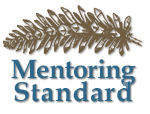Finding a Mentor
The best way to find a mentor is through an established formal program, such as TechWomen or the IEEE Mentoring Program, or in a university or corporate-sponsored program.
If that is not possible, four steps to follow on your own:
- Consider: What are your 3 top learning goals? Use SMART criteria (specific, measurable, realistic, achievable, and time-bound).
- Research: Who is walking ahead of you toward those learning goals? Ask people who know you well for advice.
- Prepare: What are your expectations? Who can introduce you (act as your matchmaker)? How much time are you asking for?
- Ask a matchmaker (a senior person in good standing who knows you) to send potential mentor your resume and 3 learning goals. Ask to be introduced to set up a 1 hour exploratory meeting.
After you have done your research and are sure that you have identified a good potential mentor, be careful to keep both parties safe and comfortable. Consider having your first few meetings in a public, neutral place (such as a coffee shop, or hotel lobby) to learn more about each other before committing to a longer relationship. If the mentor candidate does not accept your request to continue – or if you do not feel comfortable going forward, part respectfully (and promptly send them a note thanking them for their time), then go on to the next best candidate on your list until you find a mutually-agreeable match.
Sheryl Sandberg on Finding a Mentor
-
- “Because it is harder for young women to find mentors and sponsors, they are taking a more active role in seeking them out. And while normally I applaud assertive behavior, this energy is sometimes misdirected. No matter how crucial these connections are, they probably won’t develop from asking a virtual stranger, ‘Will you be my mentor?’ The strongest relationships spring out of a real and often earned connection felt by both sides.”
- “Studies show that mentors select protégés based on performance and potential. Intuitively, people invest in those who stand out for their talent or who can really benefit from help. Mentors continue to invest when mentees use their time well and are truly open to feedback”
- More: Sandberg, Sheryl. Lean In: Women, Work, and the Will to Lead. Alfred A. Knopf, 2013
Being a Good Mentee
1. Mentee Advice – from the American Association of University Women, 2013:
-
-
-
- Do your homework. Come prepared to meetings with your mentor. Make sure you’ve done any readings assigned you. If your mentor makes a professional recommendation, do it — no matter how awkward it may seem.
- Ask questions. You want to learn how your mentor thinks and makes decisions — so ask!
- Be respectfully persistent. Relationships often fall apart because the mentee didn’t follow up. Don’t worry about hounding your mentor; you already have permission to ask.
- Be committed. The effort you put into this relationship will directly affect the results, so make the time needed for the relationship.
- Be patient. Often, the mentor learns more in the short term than the mentee will. During your meetings, the mentor may get a concrete understanding of the problems in the profession. The mentee, on the other hand, takes longer to process what she’s learning. It may take years for the mentee to fully understand the lessons learned from the relationship.
-
-
From: “National Mentoring Month: 3 Tips from a Guru” interview with Katy Dickinson by the American Association of University Women, 2013.
2. Mentee Advice – from a Carnegie Mellon University mentoring program, started in 2010:
-
-
-
- Show up. Not just physically, but mentally, to every interaction. Come with goals, come with questions, come with ideas.
- Follow up. If your mentor gives you a contact, send the email that day. If someone helps you, send a thank you email
- Read up. Constantly researching your field, your colleagues, and your competitors is the name of the game.
-
-
In addition, keep in mind that “When you invest your time in being a committed mentee, you will be rewarded with accelerated experiences from your mentor.”
From: “3 Tactics for Being a Good Mentee”, (Carnegie Mellon University – Dietrich College Career Mentoring Program), by Jessica Dickinson Goodman, 2012.
Published as a Mentoring Standard web page: 16 Sep 2015. Revised 25 Apr 2016.
More: Research and Publications

